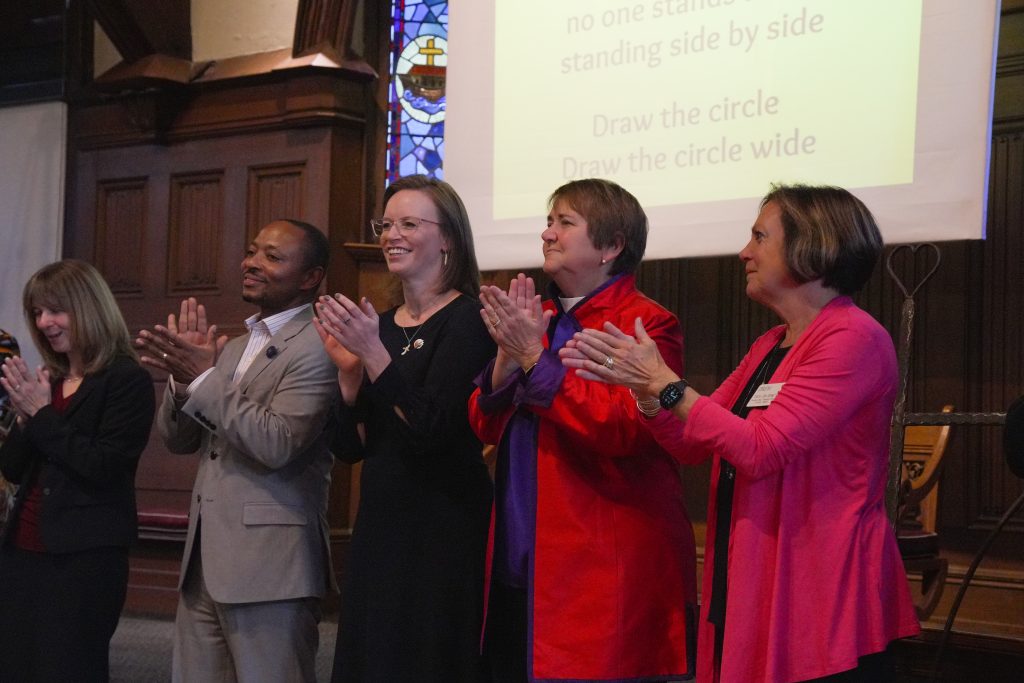On a sunny and warm autumn evening, United Methodists from across the connection gathered in Craig Chapel at Drew University to attend the opening celebration for the Center for LGBTQ+ United Methodist Heritage. It was a poignant evening, filled with songs of both victory and lament, as those gathered celebrated the progress that has been made, grieved the long and painful journey, and acknowledged that we have not yet arrived—there is still work to be done in the name of justice and full inclusion for all of God’s children.
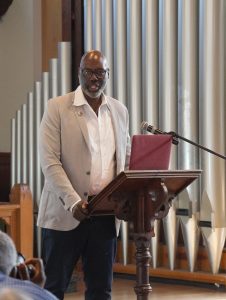 Dr. Ashley Boggan and Bishop Karen Oliveto welcomed everyone to the historic evening and then handed the microphone to Dr. Randall Miller, director of the Global Religions program at the Arcus Foundation, which seeks to build and support a worldwide network of pro-LGBT religious leaders and organizations within Jewish, Christian, and Muslim communities. Dr. Miller traced the history of the reconciling movement for the full inclusion and acceptance of LGBTQ+ folks in the UMC.
Dr. Ashley Boggan and Bishop Karen Oliveto welcomed everyone to the historic evening and then handed the microphone to Dr. Randall Miller, director of the Global Religions program at the Arcus Foundation, which seeks to build and support a worldwide network of pro-LGBT religious leaders and organizations within Jewish, Christian, and Muslim communities. Dr. Miller traced the history of the reconciling movement for the full inclusion and acceptance of LGBTQ+ folks in the UMC.
He cited 1 John 4:18 as the central organizing principle of the reconciling movement: “There is no fear in love, but perfect love casts out fear; for fear has to do with punishment, and whoever fears has not reached perfection in love.” He named James Baldwin as the prophet who inspired and sustained the movement, noting Baldwin’s insight that “telling our stories is a crucial component of claiming our sacred and essential worth.” But the quote that truly captured the essence of the movement was this: “You gotta be a witness. Testify from whence you came, where you are going, and the possibilities you think you see.”
Dr. Miller walked folks through the highs and lows of the movement toward full inclusion, recalling the early dissenters who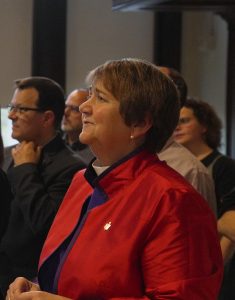 persisted in living as ministers of the gospel, witnessing in front of the doors of the annual conferences from which they had been expelled. He discussed the rise of National Affirmation, whose meetings provided a safe haven for LGBTQ+ persons who wanted to live out their identities, and the emergence of the reconciling congregation program in the mid-1980s.
persisted in living as ministers of the gospel, witnessing in front of the doors of the annual conferences from which they had been expelled. He discussed the rise of National Affirmation, whose meetings provided a safe haven for LGBTQ+ persons who wanted to live out their identities, and the emergence of the reconciling congregation program in the mid-1980s.
He noted that the movement toward full inclusion really took off once the parents of LGBTQ+ children joined the movement, steadfast in their refusal to accept the rejection of their children by the church. He recalled one mother who had the remarkable gift of “crying at the drop of a hat,” which she would regularly employ at meetings with church leaders.
He told the story of the season of tears, as church trials increased and both gay clergy and straight allies were defrocked, tracing the shock of the 2019 conference and the joy of electing our first openly lesbian bishop. He named both the joy in the room over the removal of restrictions and the palpable grief. For decades, LGBTQ+ folks, like Jacob with the angel, had been wrestling for full inclusion, and while they have now overcome, “we are limping into the dawn.”
The work ahead is to heal the suffering, bring others into the movement, and move forward, for the work is not finished. Dr. Miller concluded, “We must stand in solidarity. As a Black person for full inclusion, which was overwhelmingly white, we dare not let this become a movement only for white middle-class people. We owe it to pay it back for other people’s full welcome and acceptance in the UMC.”
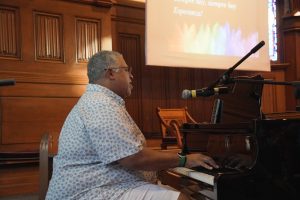 From there, the evening transitioned to a time of open storytelling. Dr. Mark Miller led a round of singing, where those gathered sang songs of solidarity for those who are suffering today, as well as songs that marked the movement for full inclusion, including “Child of God,” which Miller wrote during the trial of Rev. Frank Schaefer, and “Draw the Circle Wide” and “Queerfully and Wonderfully Made,” which he wrote as a song of affirmation for LGBTQ+ United Methodists as they prepared for the 2020/2024 General Conference.
From there, the evening transitioned to a time of open storytelling. Dr. Mark Miller led a round of singing, where those gathered sang songs of solidarity for those who are suffering today, as well as songs that marked the movement for full inclusion, including “Child of God,” which Miller wrote during the trial of Rev. Frank Schaefer, and “Draw the Circle Wide” and “Queerfully and Wonderfully Made,” which he wrote as a song of affirmation for LGBTQ+ United Methodists as they prepared for the 2020/2024 General Conference.
After the singing, the crowd dispersed to look at materials from the history of the movement for the full inclusion of LGBTQ+ folks, including a quilt made by reconciling congregations in the early 1990s. After viewing memories from the journey, those assembled turned their attention to “1946: The Mistranslation that Shifted a Culture,” which traced how the mistranslation of a few words in the 1946 edition of the Revised Standard Version of the Bible, an influential translation, was picked up and propagated in other translations, leading to the exclusion of LGBTQ+ folks from participation in the church. The viewing was followed by a Q&A with Kathy Baldock, a researcher and speaker who, together with Ed Oxford, uncovered the history of the mistranslation.
It was a poignant evening. Bishop Karen Oliveto, chair of the Heritage Center, shared that for her the evening contained both joy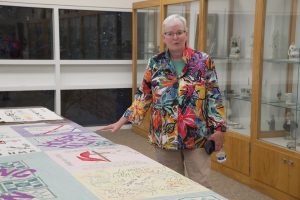 and grief, “To claim the fullness of the history, the joys, the pain, and the costs of the LGBTQ+ members will help us chart our future… It embodies great hope.” Jan Lawrence, head of Reconciling Ministries Network (RMN), shared that sense of overwhelm and hope: “I have a sense that we are at an opportune moment. As RMN and the UMC, we must move toward a justice-oriented direction and look at things through an intersectional lens. We have this opportunity for the movement and the church to move forward in a way that is more justice-seeking, an opportunity to decide together what is next.”
and grief, “To claim the fullness of the history, the joys, the pain, and the costs of the LGBTQ+ members will help us chart our future… It embodies great hope.” Jan Lawrence, head of Reconciling Ministries Network (RMN), shared that sense of overwhelm and hope: “I have a sense that we are at an opportune moment. As RMN and the UMC, we must move toward a justice-oriented direction and look at things through an intersectional lens. We have this opportunity for the movement and the church to move forward in a way that is more justice-seeking, an opportunity to decide together what is next.”
Rev. Giovanni Arroyo, General Secretary for the General Commission on Religion and Race, was also present at the event and was grateful for the opportunity to hear the stories of pain and victory, while being clear-eyed about the work ahead. “General Conference changed law but didn’t change hearts. The work we have ahead is to continue to build relationships across diverse perspectives. The hardest journey is from the head to the heart. How can we be more attentive to each other’s sacred stories? Can we see how the tapestries come together and see God’s beloved community formed?”
Rev. Arroyo’s question is worth pondering. In this era of political polarization, where we are so quick to judge—and subsequently dismiss—someone with whom we disagree. Will we allow ourselves to see the ways in which God is weaving our stories together into a beautiful tapestry of one kin(g)dom of God? I suspect that this just might be the holy calling of United Methodists in this season.

